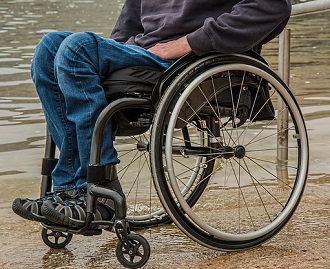Employers Must Take Note of Wheelchair Victory in Bus Space Court Battle
Employers Must Take Note of Wheelchair Victory in Bus Space Court Battle

The Supreme Court has ruled that bus drivers will have to do more to make “reasonable adjustments” to accommodate wheelchair users where possible. Employers, educational establishments, associations and landlords also have the same duty to make “reasonable adjustments”, so the decision extends beyond the realm of public transport providers.
Wheelchair user sues bus company after being forced to wait
Veteran disability campaigner Doug Paulley brought the case to the Supreme Court after being left at a bus stop in February 2012 when a mother with a sleeping baby refused to move her buggy. The mother claimed the buggy did not collapse and Mr Paulley was forced to wait for the next bus. He sued FirstGroup, the bus operator, for breaching the Equality Act 2010 by not making “reasonable adjustments” for wheelchair users who wanted to travel.
An initial County Court decision, in which Mr Paulley was awarded £5,500 damages and in which it was ruled FirstGroup should have insisted that the mother move out of the way or be forced to get off the bus, was subsequently overturned by the Appeal Court, which found there needed to be a balance between the needs of wheelchair users and other vulnerable passengers, including parents with babies in buggies.
Bus company hadn’t done enough to protect disabled passengers’ rights
In his ruling, Lord Neuberger agreed that the bus company’s policy had not done enough to protect the rights of disabled passengers.
“Where the driver concludes that the non-wheelchair user’s refusal [to move] is unreasonable, it seems to me that it would be unjustifiable for a bus-operating company to have a policy which does not require some further step of the bus driver in any circumstances”, he said.
“In particular, where there is some other place on the bus to which a non-wheelchair user could move, I cannot see why a driver should not be expected to rephrase any polite request as a requirement, and, if that does not work and especially if the bus is ahead of schedule, why the driver should not be expected to consider whether there was any reason why the bus should not stop for a few minutes with a view to pressurising or shaming the recalcitrant non-wheelchair user to move,” he noted.
Non-wheelchair users cannot be compelled to move
However, the judgement fell short of making it a legal requirement for bus companies to compel non-wheelchair passengers to move from the space. The Supreme Court found there could be circumstances where it was reasonable for a passenger to refuse to vacate the wheelchair slot. In these cases, Lord Neuberger said it would be “unreasonable” for the driver to apply any added pressure.
Notwithstanding Lord Neuberger’s caveats, the Equality and Human Rights Commission, which supported Mr Paulley, said the Supreme Court decision was “a victory for disabled people’s rights” and “a hugely important decision, which has helped clarify the current state of the law, and will give confidence to thousands of disabled people in Britain to use public transport”.
Giles Fearnley, managing director of First Bus, also welcomed the judgment: “[The Supreme Court] has ruled that bus drivers are not required to remove customers from vehicles, which was a key issue for us. This provides welcome clarity for bus operators, our drivers, and our customers.”
Employers must ensure staff are trained to enforce policy
While the Supreme Court’s ruling falls short of finding that bus companies can remove non-wheelchair users from the bus, it makes clear they must do more than simply request they move from the wheelchair place.
The ruling has major implications for all service providers with wheelchair spaces or facilities, such as supermarket car parks and disabled toilets on trains.
Companies will have to make sure their policies go far enough to avoid substantial disadvantage to wheelchair users, and that employees are properly trained to enforce them.
Creating fair employment policies for your business or organisation
For advice on creating fair employment contracts and policies please contact our employment lawyers today on 01895 207892 or email employment@ibblaw.co.uk. Alternatively please click here for more information.
